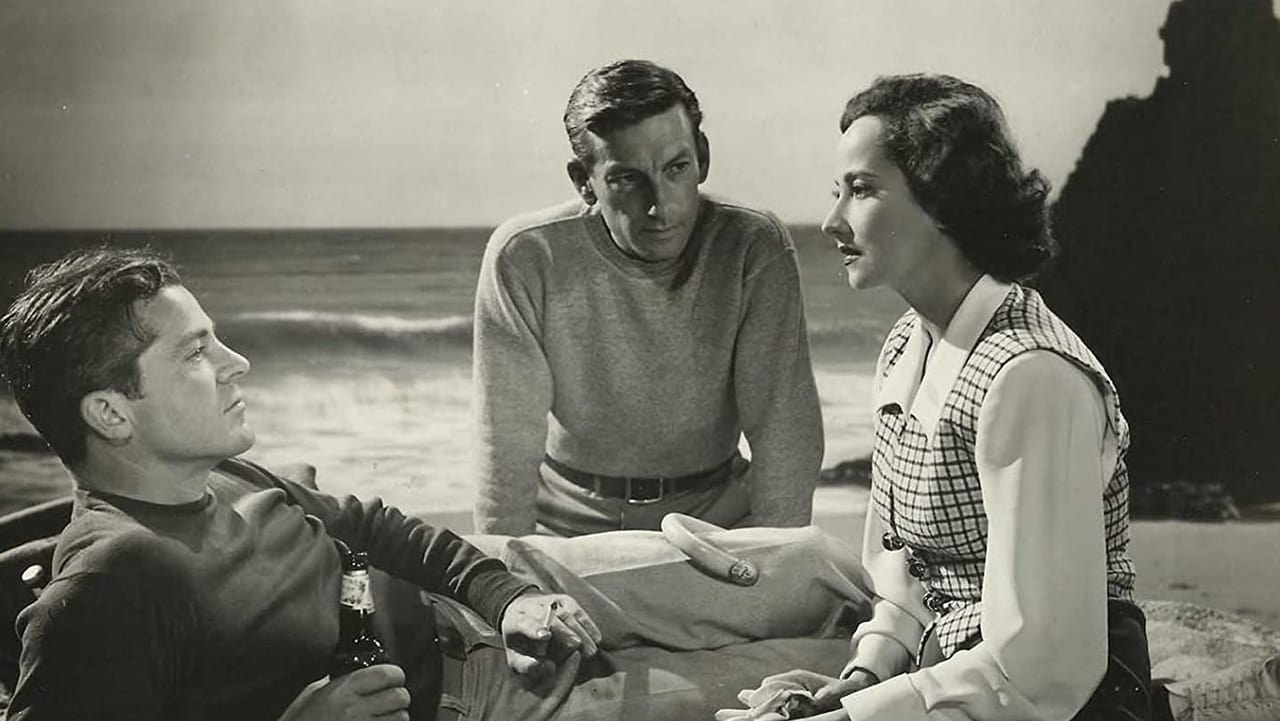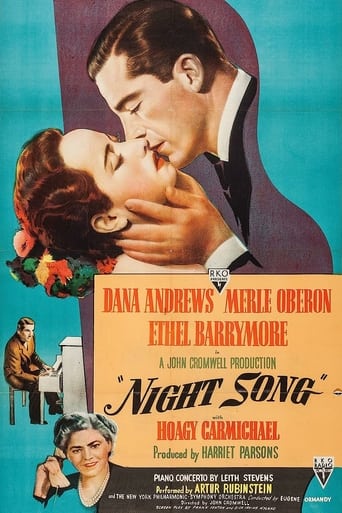

This Movie Can Only Be Described With One Word.
... View MoreAm i the only one who thinks........Average?
... View Moreif their story seems completely bonkers, almost like a feverish work of fiction, you ain't heard nothing yet.
... View MoreA clunky actioner with a handful of cool moments.
... View MoreNIGHT SONG might only appear to be a routine example of the kind of postwar romance that most of the major studios produced. A blind bar pianist (Dana Andrews) is taken up by a wealthy socialite (Merle Oberon), who pretends to be blind herself in order to secure his confidence. After a courtship in San Francisco, the pianist is given sufficient financial backing to have an operation to restore his sight, and receive a concert premiere of his new concerto at Carnegie Hall, New York. He returns to San Francisco, where he meets his beloved, and the two them vow eternal love.Frank Renton and Dick Irving Hyland's screenplay contains its fair share of intertexts. The idea of a concert performance dates back to Brian Desmond Hurst's huge British wartime hit DANGEROUS MOONLIGHT (1941), that contained the premiere of Addinsell's "Warsaw Concerto," while Andrews's predicament as a war-scarred survivor cross- references Goldwyn's THE BEST YEARS OF OUR LIVES (1946), in which the actor had given an equally memorable characterization in a similar role.Yet nonetheless NIGHT SONG possesses a certain integrity. Director John Cromwell establishes a close bond between Andrews and his boon companion Chick (Hoagy Carmichael, who even gets a solo number), and by doing so suggests the importance of male bonding in an often uncertain world. No one, it seems, knows really what to do with the peace, after having won the war; the only outlet both men can find is playing bands in some cheap SF dive bars.This relationship is contrasted with the more spiky friendship between Oberon and her boon companion Miss Willey (Ethel Barrymore). The grande dame of the American theater gives one of her more commanding characterizations as a supposed cynic with a heart of gold, who readily understands the agonies her younger friend experiences as she tries to woo the pianist without hurting his feelings. In an environment where people seldom gave vent to their emotions in public, emotional expression is put at a premium.The end of the movie is enlivened by a live performance from Leopold Stokowski and Eugeme Ormandy playing themselves with the New York Philharmonic Orchestra. They do not have to do much, but they set about delivering the concerto (with music by Leith Stevens) with a conviction and gusto that is truly refreshing.
... View MoreIn a brief triumph of hope over knowledge I entertained fleetingly the notion that this just might be a movie version of Cliff Odets' Night Music, his 1940 play whose failure in 1940 led to the demise of the charismatic Group Theatre out of which emerged so many lustrous talents both behind - Odets himself, Harold Clurman, Lee Strasberg, Elia Kazan - and in front of the camera - Kazan again, Lee J. Cobb, Franchot Tone, John Garfield. In the event, of course, Night Song is a totally different affair improbably cast and with more holes than a Swiss cheese - for example Hoagy Carmichael leads a 'swing' band with a residency in a night club in San Francisco in which Dana Andrews is the blind pianist; we never hear the band playing anything remotely resembling swing and after the first reel we never see the band or the club again concentrating instead on the unlikely quartet comprising the two men plus Merle Oberon and Ethel Barrymore. Having fallen for Andrews on sight (sorry about that) whilst 'slumming', society dame Oberon affects blindness of her own to win Andrews love. His condition can, of course, be cured in a heartbeat but it will take major bucks and a surgeon in New York. He thinks that Oberon hasn't got change of a match and wouldn't take her money even if he knew she was really Miss Gotrocks but love of course will find a way. Oberon 'creates' a music competition with five K (this is 1947) for the best classical competition and arranges for Andrews to win it. Do I really need to go on? If you can get past this hoke and more - and yes, there IS more, I kid you not, then chances are you'll enjoy it.
... View MoreI gather from Paramount's Press Book that the purpose of this movie was to introduce a new piano concerto by Leith Stevens. Alas, if Paramount Publicity is to be believed, that aim fails dismally. Despite being rendered here by Arthur Rubenstein and the New York Philharmonic Orchestra conducted by Eugene Normandy, the concerto is as dull as the surrounding story is silly. True, our star, Merle Oberon, is beautifully photographed and gorgeously gowned. Also true that director John Cromwell and actors Hoagy Carmichael and Ethel Barrymore try their best to work up an audience's interest in the proceedings. The problem is that the script is so absurd, it would have made a really great spoof if only the actors and the director had decided NOT to play it straight! (I gave this movie 2/10 in my original review, but maybe that's being too hard even though it does force audiences to sit still for 102 minutes.)
... View MoreBearing more than a distant resemblance with "magnificent obsession" ,Stahl's tear jerker of the thirties (remade by Douglas Sirk in the fifties )"Night Song " is less melodramatic ,but ,mainly in its second part ,drags on a little bit;the movie features two real life musicians :Arthur Rubinstein in the flesh ,and Hoagy Carmichael whose songs were covered even by Beatle George Harrison ("Baltimore Oriole"," Hong Hong Blues) and his influence shows in McCartney's song "baby's request" .Dana Andrews is reliable as ever ,and Madame Barrymore provides good support (dig the line when she tells her niece that all she wants is peace);Merle Oberon's playing is a bit emotionally remote ;the music is omnipresent ,classical stuff or Carmichael's "monkey song" .But the story itself is a bit derivative.
... View More